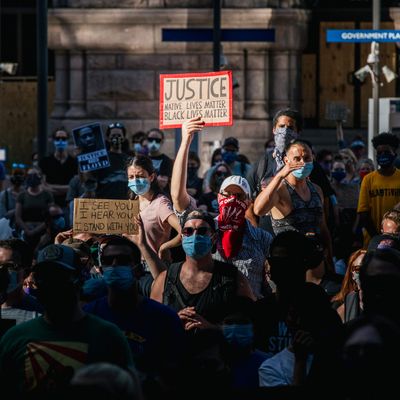
Even in a half-paralyzed Congress struggling with the coronavirus pandemic and a devastated economy, the protests against police misconduct unleashed by the killing of George Floyd are already producing activity. And while it’s too early to call the momentum “bipartisan,” there are “police reform” bills rapidly emerging in the Democratic House and the Republican Senate that have significant similarities and one key difference.
The House bill, which is being marked up for floor action in the Judiciary Committee today, was developed by the Congressional Black Caucus and takes a straightforward approach to the most notorious types of police misconduct, as my colleague Sarah Jones summarized it:
The bill creates a national database to track incidents of police misconduct, and would narrow the use of qualified immunity, which protects officers from lawsuits over their use of force or other violations of a person’s constitutional rights …
The bill also addresses some use of force by police. It would ban choke holds and carotid holds, a stranglehold intended to temporarily cut off the blood supply to a person’s brain. The Post says it would prohibit “no-knock warrants in drug cases at the federal level, while pressuring states and municipalities to enact similar prohibitions by withholding funding,” and “limit” the provision of military equipment and weapons to the police. The Civil Rights Division of the Justice Department would also receive increased power to investigate bias and misconduct in police departments, and lynching would become a federal crime.
Despite what the president and many conservative commentators assert, the House bill, which has been embraced by Senate Democrats as well, in no way, shape, or form promotes any “defunding” of police departments, or for that matter, any systemic reforms. Its aim is to selectively prohibit specific abuses while increasing accountability for misconduct.
The Senate Republican bill that will be unveiled today with African-American senator Tim Scott credited as the chief architect also discourages specific police abuses, with the bill’s generally non-prescriptive nature being touted as an advantage, according to the Washington Post:
Senate Republicans on Wednesday unveiled a policing reform bill that would discourage, but not ban, tactics such as chokeholds and no-knock warrants, offering a competing approach to legislation being advanced by House Democrats that includes more directives from Washington.
The Republican proposal veers away from mandating certain policing practices, as the Democratic plan does …
On Tuesday, McConnell dismissed the House Democratic bill as “typical Democratic overreach to try to control everything in Washington,” adding: “We have no interest in that.”
The Senate bill also makes lynching a federal hate crime, a provision that papers over the embarrassing recent stoppage of long-awaited anti-lynching legislation via dilatory tactics from Senator Rand Paul.
Other than the general disagreement over the strictness of federal mandates in the House Democratic and Senate Republican bills, which could probably be resolved in a compromise, the key difference involves the murky but important issue of “qualified immunity” for police officers and other public officials. Vox’s Ian Millhiser explains the significance of this principle, which was developed not by policymakers but by the courts, particularly in the key Supreme Court decision in the 1982 case Harlow v. Fitzgerald:
In theory, qualified immunity shields government officials from lawsuits involving novel legal claims. As the Supreme Court held in Harlow v. Fitzgerald (1982), “government officials performing discretionary functions, generally are shielded from liability for civil damages insofar as their conduct does not violate clearly established statutory or constitutional rights of which a reasonable person would have known.”
In practice, however, qualified immunity can protect truly egregious conduct by police. As the Supreme Court put it in Malley v. Briggs (1986), qualified immunity “provides ample protection to all but the plainly incompetent or those who knowingly violate the law.”
The House Democratic bill would strip police and correctional officers of the qualified-immunity shield for unlawful conduct, making them subject to civil lawsuits like anyone else. The urgency of the issue was significantly enhanced just this week by the Supreme Court’s refusal to accept a batch of cases that would have given it the opportunity to review its guidance on qualified immunity.
While there is some interest in scaling back or abolishing qualified immunity among libertarian-leaning Republicans, Tim Scott called it a “poison pill” and declared it “off the table” in any future negotiations between Democrats and Republicans on a police-reform bill. It’s very likely that the president, who coupled his own modest efforts to address police misconduct by executive order with fiery statements of solidarity with the police, will threaten to veto any legislation that significantly erodes this protection.
So you can expect a period of partisan competition on police reform, with the key calculation being whether some compromise on qualified immunity is possible and/or necessary. In the background, both parties may also be weighing the possibility that police reform will become a major 2020 campaign issue.






























